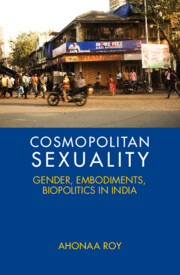Book contents
- Frontmatter
- Dedication
- Contents
- List of Figures
- List of Abbreviations
- Acknowledgements
- 1 Introduction
- 2 Bioengineering, Beauty and Racial Sensibility
- 3 Contesting Violence, Constructing Power
- 4 Festival, Spectacle, Eroticism
- 5 Biopolitics and Biosocial Citizenship
- 6 Performative Participation, Sexual Health and Community Development
- 7 Cosmopolitanism: Rights, Citizenry and the Culture of Representation
- 8 Postscript
- Glossary
- Index
5 - Biopolitics and Biosocial Citizenship
Published online by Cambridge University Press: 14 October 2022
- Frontmatter
- Dedication
- Contents
- List of Figures
- List of Abbreviations
- Acknowledgements
- 1 Introduction
- 2 Bioengineering, Beauty and Racial Sensibility
- 3 Contesting Violence, Constructing Power
- 4 Festival, Spectacle, Eroticism
- 5 Biopolitics and Biosocial Citizenship
- 6 Performative Participation, Sexual Health and Community Development
- 7 Cosmopolitanism: Rights, Citizenry and the Culture of Representation
- 8 Postscript
- Glossary
- Index
Summary
Human sexuality is based on a range material and cultural forces organized on the pluralities and the multiplicities of social spaces, and the varied choices are emerging truths shaped in postmodern society (Featherstone 1991b, 2000; Giddens 1991; Plummer, 2003). Since the 1980s, there has been a major developmentf in the anthropological studies of body and embodiment (Grosz 1995b; Hird 2002, Shilling 2003; Turner 2008), which have indeed become a central feature of social life and its processes. The studies on body began to take seriously the important notions of symbolism and the practices of sex, as harbouring a host of meanings. One such important aspect is the new bodytechnologies of sexuality that are managed through medical intervention, conferring new modes of embodied sexuality (Bray 2007). Contemporary social theorists on the body have marked the increasing significance of the rise of individualism and consumerism that produce an unprecedented meaning of the body, bearing a symbolic value (Bourdieu 1989). Bourdieu's understanding of class and embodiment relates to the notion of the individual's social position and the formation of their ‘habitus’ and development of their ‘tastes’ – concerned with the management of their class and status in society. This posits a stark contrast to the formation of radical gender politics and transgressions in identity politics, bodies and embodiment and performances. This could be the starting point to talk about the new body technologies and the medical interventions that further act as a site of individual and aesthetic expression to create an identity that holds a bodily signification, visual image and corporeal stylization (Bolin 1994).
In relation to this argument, transsexuality and the medical establishment install an archetypical construction attributing reconstructive surgery and genital reassignment to the logic of mutilation of bodies, and bring about the change by means of curative genital surgeries. Surgical incursions into the transsexual body allow the bodily incorporation of the desired gender that is linked to the reality of their ‘gender passing’, and the shift from ‘doing’ to ‘being’ and from ‘performative’ to ‘flesh’ (Prosser 1998: 89).
The transsexual scholarship on embodying gender re-interrogates the understanding of agency and subjectivity that are deeply personal and profoundly political.
- Type
- Chapter
- Information
- Cosmopolitan SexualityGender, Embodiments, Biopolitics in India, pp. 128 - 173Publisher: Cambridge University PressPrint publication year: 2023



